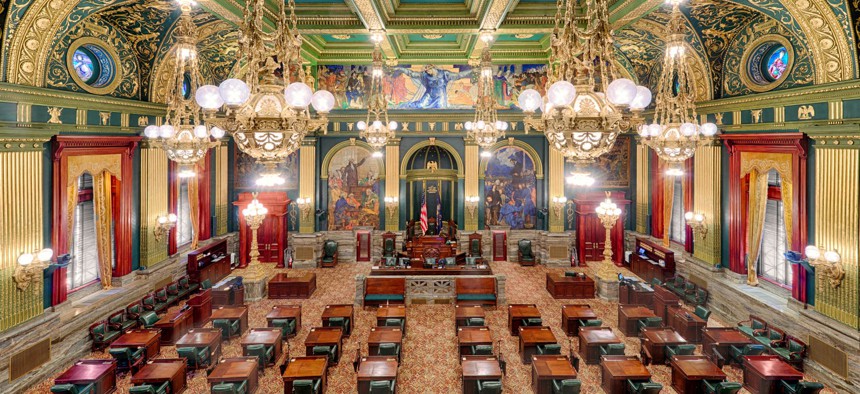Medicaid Proposals in GOP’s Obamacare Repeal Bill May Force States to Scramble

The Pennsylvania Senate Chamber at the State Capitol in Harrisburg. Shutterstock

Connecting state and local government leaders
State governments can’t easily go “from a 90 percent federal match to a 50 or 55 or 60 percent federal match overnight.”
WASHINGTON — Changes to Medicaid packaged into legislation U.S. House Republicans released Monday as part of an effort to repeal the Affordable Care Act would have major implications for state budgets and for Americans now eligible for the entitlement program.
Federal funding going to states for Medicaid would be capped per enrollee in the years ahead as part of the GOP proposal. And boosted federal payments that helped incentivize states to expand Medicaid’s income eligibility threshold so the program was open to more people would be frozen beginning in 2020.
“With today’s legislation, we return power back to the states—strengthening Medicaid,” House Energy and Commerce Committee Chairman Greg Walden, an Oregon Republican, said in a statement Monday when the legislation was unveiled.
The Energy and Commerce Committee has scheduled a Wednesday markup of the legislation that includes the Medicaid provisions.
Medicaid provides access to health care for lower income Americans and is a substantial expense for the federal government and states.
Matt Salo, executive director of the National Association of Medicaid Directors, said Monday that the Republican proposal “does contain some pretty significant changes for Medicaid.”
But he added that the measure should be considered in context.
“The bill that was released today is not something that will be enacted into law,” Salo told Route Fifty in an interview. “It is the first step in what will be a very long and very complicated and, often times, very difficult process.”
Under the Affordable Care Act, also known as Obamacare, states were given the option to expand Medicaid to cover most low-income adults earning up to 138 percent of the federal poverty level—around $34,000 this year for a family of four.
If states chose this option, the federal government agreed to pay 100 percent of the expansion costs from 2014 to 2016. After that, the percentage decreases gradually until hitting 90 percent in 2020 and the years thereafter.
The newly released bill calls for repealing this so-called “enhanced match rate” on Dec. 31, 2019 for new beneficiaries who would now be covered by the expansion.
For people who enroll under the expansion before then, the enhanced match would apply.
But Salo noted if these people “churn” off of the Medicaid program and return to it once the enhanced match rate is no longer available, it could be “highly problematic for states.”
“Going from a 90 percent federal match to a 50 or 55 or 60 percent federal match overnight,” he said, “states generally just don’t have that kind of money … Those people would lose coverage.”
Salo stressed that his comments were not meant to be a formal position on the bill or issues tied to Medicaid for National Association of Medicaid Directors.
The GOP proposal would also provide $10 billion of “safety net” funding over five years, between 2018 and 2022, for states that have not expanded Medicaid. The allotment of these funds would be based on a calculation that considers the number of people in the state that had incomes below 138 percent of the federal poverty level in 2015.
In contrast to the “per capita cap” model in the new legislation, which places per-enrollee limits on payments to states, Medicaid is set up now so that federal funding is open-ended and fluctuates according to factors like costs for care and enrollment.
Democratic governors came out strongly against per capita caps during a gathering of governors from around the country late last month in Washington, D.C..
“Any plan that cuts Medicaid or reduces options for affordable, quality health insurance for Pennsylvanians is unacceptable,” Pennsylvania Gov. Tom Wolf, a Democrat, said in a statement Monday after the Republican legislation was released. “I strongly encourage everyone in the Pennsylvania delegation to reject this proposal,” he added.
Pennsylvania was one of 31 states along with the District of Columbia that had adopted the Medicaid expansion as of Jan. 1.
Four GOP senators, Rob Portman of Ohio, Shelley Moore Capito of West Virginia, Cory Gardner of Colorado and Lisa Murkowski of Alaska sent a letter to Senate Majority Leader Mitch McConnell on Monday raising concerns about the possibility of changes to Medicaid.
“We believe Medicaid needs to be reformed, but reform should not come at the cost of disruption in access to health care for our country’s most vulnerable and sickest individuals,” they wrote.
“Any changes made to how Medicaid is financed through the state and federal governments should be coupled with significant new flexibility so they can efficiently and effectively manage their Medicaid programs to best meet their own needs,” the senators added.
Republicans hold a 52-seat majority in the Senate.
During fiscal year 2015, Medicaid spending totaled around $532 billion, according to figures compiled by The Henry J. Kaiser Family Foundation. The federal government picked up about $334 billion, or roughly 62 percent of those costs. States covered around 37 percent.
About 74 million people nationwide late last year were covered by Medicaid and the related Children's Health Insurance Program, or CHIP. Average monthly enrollment in the program prior to the Affordable Care Act was around 57 million people.
Bill Lucia is a Senior Reporter with Government Executive’s Route Fifty, and is based in Washington, D.C.

NEXT STORY: San Bernardino County Enlisted Its Transportation Authority’s Help to Improve Health Outcomes





